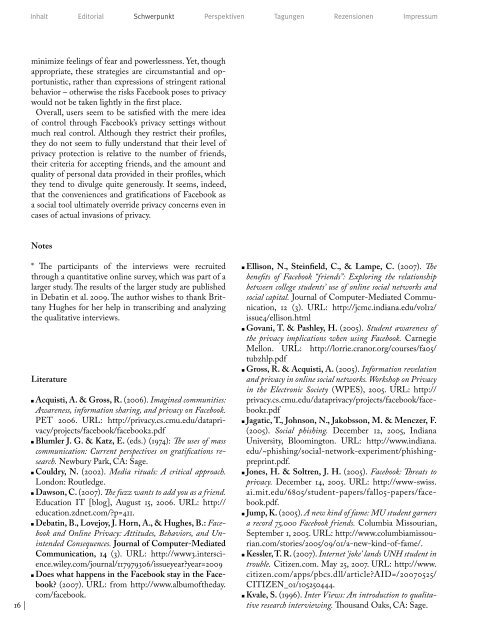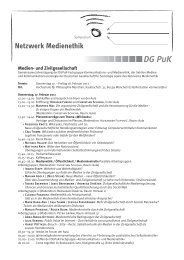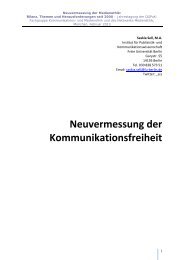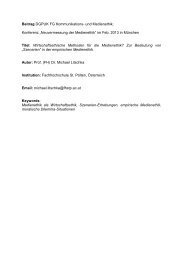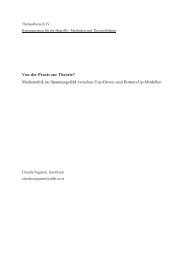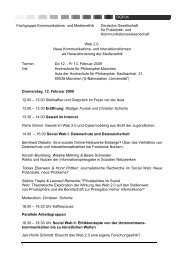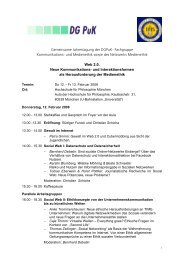Web 2.0 Neue Kommunikations - Netzwerk Medienethik
Web 2.0 Neue Kommunikations - Netzwerk Medienethik
Web 2.0 Neue Kommunikations - Netzwerk Medienethik
Sie wollen auch ein ePaper? Erhöhen Sie die Reichweite Ihrer Titel.
YUMPU macht aus Druck-PDFs automatisch weboptimierte ePaper, die Google liebt.
16 |<br />
Inhalt Editorial Schwerpunkt Perspektiven Tagungen Rezensionen Impressum<br />
minimize feelings of fear and powerlessness. Yet, though<br />
appropriate, these strategies are circumstantial and opportunistic,<br />
rather than expressions of stringent rational<br />
behavior – otherwise the risks Facebook poses to privacy<br />
would not be taken lightly in the first place.<br />
Overall, users seem to be satisfied with the mere idea<br />
of control through Facebook’s privacy settings without<br />
much real control. Although they restrict their profiles,<br />
they do not seem to fully understand that their level of<br />
privacy protection is relative to the number of friends,<br />
their criteria for accepting friends, and the amount and<br />
quality of personal data provided in their profiles, which<br />
they tend to divulge quite generously. It seems, indeed,<br />
that the conveniences and gratifications of Facebook as<br />
a social tool ultimately override privacy concerns even in<br />
cases of actual invasions of privacy.<br />
Notes<br />
* The participants of the interviews were recruited<br />
through a quantitative online survey, which was part of a<br />
larger study. The results of the larger study are published<br />
in Debatin et al. 2009. The author wishes to thank Brittany<br />
Hughes for her help in transcribing and analyzing<br />
the qualitative interviews.<br />
Literature<br />
Acquisti, A. & Gross, R. (2006). Imagined communities:<br />
Awareness, information sharing, and privacy on Facebook.<br />
PET 2006. URL: http://privacy.cs.cmu.edu/dataprivacy/projects/facebook/facebook2.pdf<br />
Blumler J. G. & Katz, E. (eds.) (1974): The uses of mass<br />
communication: Current perspectives on gratifications research.<br />
Newbury Park, CA: Sage.<br />
Couldry, N. (2002). Media rituals: A critical approach.<br />
London: Routledge.<br />
Dawson, C. (2007). The fuzz wants to add you as a friend.<br />
Education IT [blog], August 15, 2006. URL: http://<br />
education.zdnet.com/?p=411.<br />
Debatin, B., Lovejoy, J. Horn, A., & Hughes, B.: Facebook<br />
and Online Privacy: Attitudes, Behaviors, and Unintended<br />
Consequences. Journal of Computer-Mediated<br />
Communication, 14 (3). URL: http://www3.interscience.wiley.com/journal/117979306/issueyear?year=2009<br />
Does what happens in the Facebook stay in the Facebook?<br />
(2007). URL: from http://www.albumoftheday.<br />
com/facebook.<br />
Ellison, N., Steinfield, C., & Lampe, C. (2007). The<br />
benefits of Facebook ‘‘friends’’: Exploring the relationship<br />
between college students’ use of online social networks and<br />
social capital. Journal of Computer-Mediated Communication,<br />
12 (3). URL: http://jcmc.indiana.edu/vol12/<br />
issue4/ellison.html<br />
Govani, T. & Pashley, H. (2005). Student awareness of<br />
the privacy implications when using Facebook. Carnegie<br />
Mellon. URL: http://lorrie.cranor.org/courses/fa05/<br />
tubzhlp.pdf<br />
Gross, R. & Acquisti, A. (2005). Information revelation<br />
and privacy in online social networks. Workshop on Privacy<br />
in the Electronic Society (WPES), 2005. URL: http://<br />
privacy.cs.cmu.edu/dataprivacy/projects/facebook/facebook1.pdf<br />
Jagatic, T., Johnson, N., Jakobsson, M. & Menczer, F.<br />
(2005). Social phishing. December 12, 2005, Indiana<br />
University, Bloomington. URL: http://www.indiana.<br />
edu/~phishing/social-network-experiment/phishingpreprint.pdf.<br />
Jones, H. & Soltren, J. H. (2005). Facebook: Threats to<br />
privacy. December 14, 2005. URL: http://www-swiss.<br />
ai.mit.edu/6805/student-papers/fall05-papers/facebook.pdf.<br />
Jump, K. (2005). A new kind of fame: MU student garners<br />
a record 75,000 Facebook friends. Columbia Missourian,<br />
September 1, 2005. URL: http://www.columbiamissourian.com/stories/2005/09/01/a-new-kind-of-fame/.<br />
Kessler, T. R. (2007). Internet ‘joke’ lands UNH student in<br />
trouble. Citizen.com. May 25, 2007. URL: http://www.<br />
citizen.com/apps/pbcs.dll/article?AID=/20070525/<br />
CITIZEN_01/105250444.<br />
Kvale, S. (1996). Inter Views: An introduction to qualitative<br />
research interviewing. Thousand Oaks, CA: Sage.


